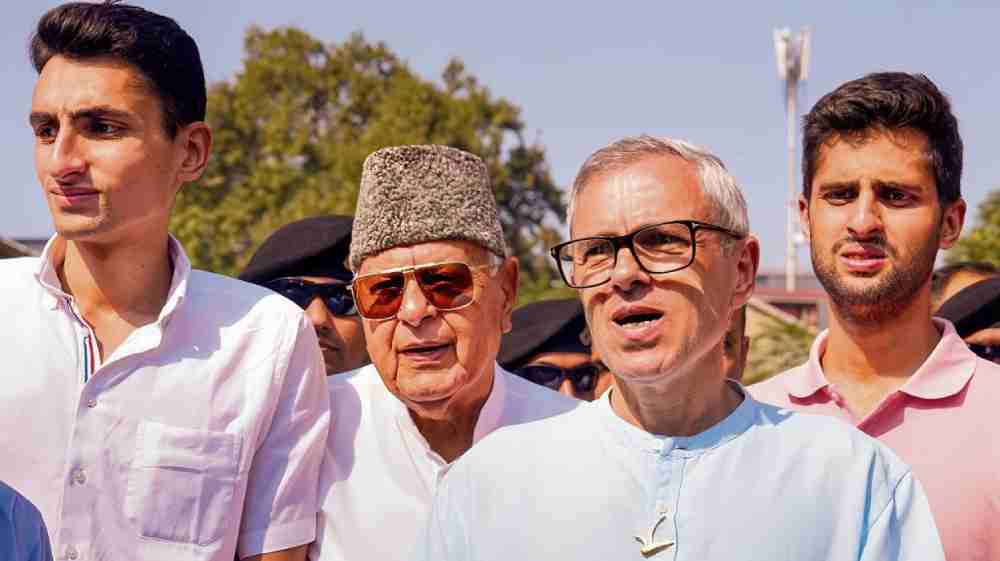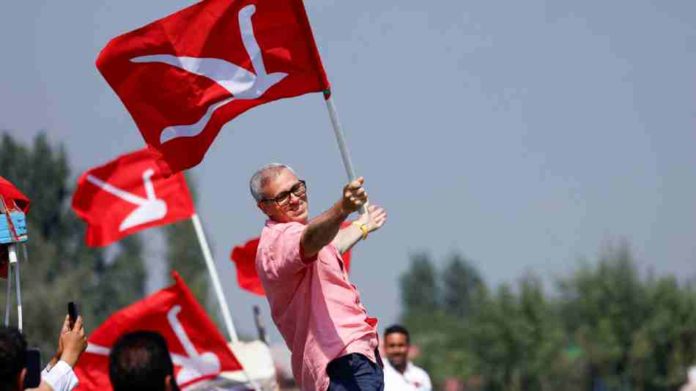The second of the three-phase assembly elections in Jammu and Kashmir had a huge emotional content but a compromised turnout. After meeting contestants and the electors during campaigning and on the day of polling, Syed Shadab Ali Gillani offers some ideas about what politicians preached and why people voted
Dusty roads and narrow paths buzzed with the energy of a massive crowd, as hoards of vehicles created a lively backdrop on the final day of campaigning for the second phase of the Jammu Kashmir assembly elections. An emotional atmosphere enveloped the Beerwah constituency as Sugra Barkati, daughter of jailed cleric Sarjan Barkati, campaigned on her father’s behalf.
Dressed in a black abhaya, Sugra stood strong among the crowd, her voice rising above the noise as she called for votes for her father. Supporters travelled on tractors and trucks, eager to join the campaign. Locals gathered along the narrow roads, offering water to participants in a show of kindness. “We can only offer this much to our daughter; it is a Sunnah to provide water to people,” quipped an elderly native.
As Sugra, a resident of South Kashmir village, moved through the constituency, a large crowd followed her. “Support her,” urged an elderly man, “She is living without her parents, and we must stand by her in every way.”
Significant Election
This election season is significant, as it follows a decade-long gap. The second of the three-phase polls offers a look into the political landscape, with many established leaders and newcomers vying for attention in 15 Kashmir constituencies.
Many hoped that voter turnout would be high this time. Cumulatively, the participation in 15 assembly seats in Kashmir and 11 in Jammu region, was recorded at 56 per cent, almost a 10 per cent decrease compared to the Lok Sabha polls.
National Conference leader Omar Abdullah attributed it to people’s reaction to the Centre trying to project normalcy. “To be honest, I was expecting higher turnout because there was no boycott call, there were attacks, and there were no threats or intimidation of the voters,” Omar told reporters in Uri. “I feel the Centre is also responsible for this. They tried to present the high voter turnout as a sign of normalcy and as if the people had accepted the revocation of Article 370. Maybe this was a reaction from Srinagar because the people of Srinagar do not want to send wrong signals.”
The comparative low turnout was reported when 16 diplomats were specially flow by the MEA to see the participation. This angered Omer. “The Centre made another mistake by inviting the diplomats. Maybe they wanted to showcase higher voter turnout in Srinagar as a sign of major change. The people of Srinagar did not want them to be used in this manner, so they voted in lesser numbers. However, I am thankful to those who came out to vote, irrespective of who they voted for,” he said.
“For those questioning the low turnout in Srinagar: the years-long crackdown on PDP, the splitting of its cadres, and the fragmentation of the opposition into three factions have pushed voters away rather than encourage participation,” PDP youth leader, Waheed Para, stated.
Emotional Campaigns
The campaigning in central Kashmir was different compared to the first phase. In Ganderbal Omar, in a rare gesture, addressed the public and held his cap in his hands, urging the people to make him win. A visibly emotional Abdullah appealed for their support, saying, “My honour is in your hands.”
“Myun dastar (my turban), myun izzat (my honour), myun topi (my cap), are in your hands, ath kariw raetch (uphold it),” he expressed, holding his cap. “Just give me one opportunity to serve you, I am appealing to you with folded hands.”
Engineer Rashid campaigned across central Kashmir, attracting large crowds. Almost everywhere, he struck an emotional chord with people with his “jail politics”.
Though her territory was limited, Sugra Barkati’s remained passionate and determined to campaign in support of her father, the Pied Piper of Kashmir. Along with her brother, she focused on Beerwah, skipping Ganderbal. “I am just an orphan. Both my parents are in jail. I want to get them out. So please vote for my father.”
Her high-pitch emotional campaign irked Nazir Khan, whose father has represented the constituency twice. “She engages in a drama. If she is poor, just ask her where she is getting the money from,” said Khan, who is also the chairman of the Budgam District Development Council (DDC).
For the second phase, Prime Minister Narendra Modi addressed two rallies, one each in Srinagar and Katra. Home Minister Amit Shah addressed rallies in Mendhar, Surankote, Thanamandi, Rajouri and Nowshera in Poonch and Rajouri. The star campaigners of the Congress included Mallikarjun Kharge and Rahul Gandhi. Gandhi addressed two rallies — one in the Surankote constituency in Poonch and another in the Central-Shalteng segment in Srinagar — to pull the curtains on the high-pitched campaign of the Congress. This was despite Omar suggesting his ally to focus on Jammu and not Kashmir.
Voters’ Concerns
A voter in his mid-fifties voted for the very first time in his life. He came from Nishat to cast his vote at Nehru Park. “We want our situations should change,” he said. “We want to have a representative, somebody who voices our concerns, and somebody who does something about it at the actual ground level, rather than sitting and promising around.”
Rehti Begum, a centenarian from Srinagar, said she voted because she wants her representative to do good for the society. “There is no employment, no food, no electricity here in Kashmir and the candidate who gets elected, if he or she is good for us then they can work on these aspects and if they are not then we are unlucky.”
A Budgam voter called the elections a festival. “The atmosphere has changed in the region,” he said. “Much like Hindus celebrate the Kumbh Mela every twelve years, the Muslims celebrate their festivals, these elections are no less than a festival.”
“I will vote for jobs,” said Vimla Koul, an old Kashmiri pandit woman, who never migrated. “We need roads, and facilities for our children.” She hoped that Kashmiri Pandits who have migrated will return home.
Many young voters also participated this time in the election process. “This is a youth election,” a young voter Umar said in Ganderbal. “There is a high level of energy and aspiration among young voters. With unemployment reaching staggering rates, I believe that our representatives can make a difference.”
As reports of the election trickled in, the narratives intertwined. A shared longing for justice resonated deeply among the people, who recounted their struggles with inadequate healthcare and crippling electricity bills. “We want our representatives to hear us,” they pleaded, eyes reflecting both determination and weariness.
Despite the challenges, the spirit of the Kashmiri people shone through. “We know we have to fight for our rights,” an elder stated, embodying the resilience of a community that refused to be silenced.
Most of the voters talked about resource exploitation, inaccessible governance structure, joblessness, inflated power tariff bills, statehood, and lack of basic amenities in addition to the system’s systematic highhandedness. This ran in contrast with the political class that made Article 370 and other things a poll plank
The Lower Turnout
“I did not vote due one simple reason,” Maleeha, a first-time voter from Srinagar said, “because no political party was able to convince me. My experiences are contradictory with the promises that are being made in the campaigns.”
Another young voter from downtown Srinagar said that she comes from a family where voting has never been a tradition. “My great-grandfather never voted, my father never voted, and neither will I,” she said. “I was supposed to be a first-time voter, but I chose not to cast my vote, which now makes me a first-time voter for the next five years until new elections.”

Confused Voters
In the narrow alleys of Boat Colony Bemina, Srinagar, many voters kept their doors shut to the voting process, confused and disengaged. They seemed unaware of the candidates representing their constituencies. One woman, in her mid-60s, who was out buying milk, shared her family’s long-standing support for the National Conference (NC) and said they have always voted for the Plough (the NC’s election symbol). She lamented, “Azi chi saree alag alag, Kah nei Kansiseth” (In this election, everyone is fighting independently). “We do not have anyone contesting from the National Conference this time, so we have decided not to vote. There are so many new faces, and we don’t know any of them. What’s the point of voting?” she remarked.
As she spoke, another passer-by joined the conversation, interrupting to inform her that the NC had formed an alliance with Congress, and Karra was representing the party. Confused, the woman walked away, murmuring, “Balai chas asi chi sirf national” (I do not care; I am just a National Conference supporter).


